Gwillim Lakes Hike, Valhalla Provincial Park
Valhalla Provincial Park is home to one of the best hikes in British Columbia. The 6 km hike into Gwillim Lakes is take-your-breath away beautiful, especially in the evening light.
You’ll find meadows to explore, mountain ridges to climb and lakes for skinny dipping. Also, look for well-spaced tent pads, a kitchen area, and a couple of outhouses. You could easily spend a few nights here.
This post includes some affiliate links. If you make a purchase via one of these links, I will receive a small commission at no extra cost to you. Thank you very much for your support.
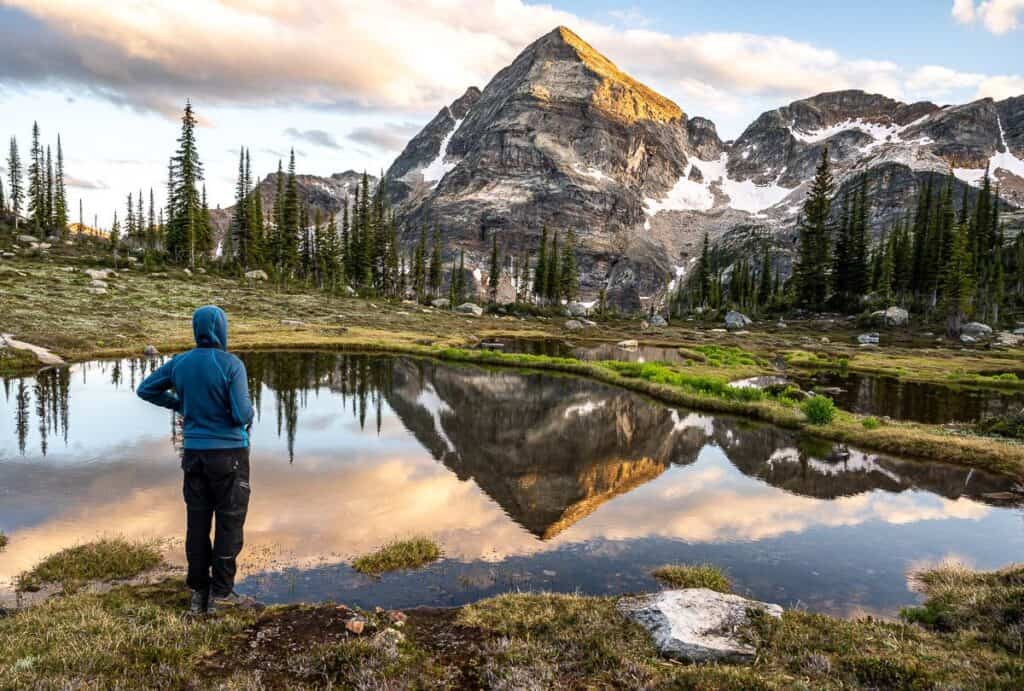
Would you like to save this?
Gwillim Lake hike in Valhalla Provincial Park summary
Distance: 11.6 km or 7.2 miles round trip
Elevation gain: Approximately 894 m
Elevation at trailhead: 1,615 m
Elevation at Drinnon Lake: 1, 950 m
Elevation at Gwillim Lakes: 2,171 m
Elevation at Lucifer Pass: 2,585 m
Best time to do the hike: Mid-July to late September
Degree of difficulty: Moderate
Time needed: 5 – 6 hours as a day trip or two days if you’re backpacking
Dogs allowed: Unfortunately you have to leave your dog at home.
Additional hiking: There is the option to scramble to Lucifer Pass. Strong hikers can get to the pass and back to the trailhead in about 10 hours. But if you overnight, it would make a great addition from the campground.
Fires: Given the frequency of fires in BC, I’d recommend downloading the BC Wildfire Service App available on Google Play.
Don’t forget: Pack the hiking essentials and be sure to carry easy to access bear spray, perhaps in a bear spray holster so you don’t set it off accidentally. This is grizzly country.
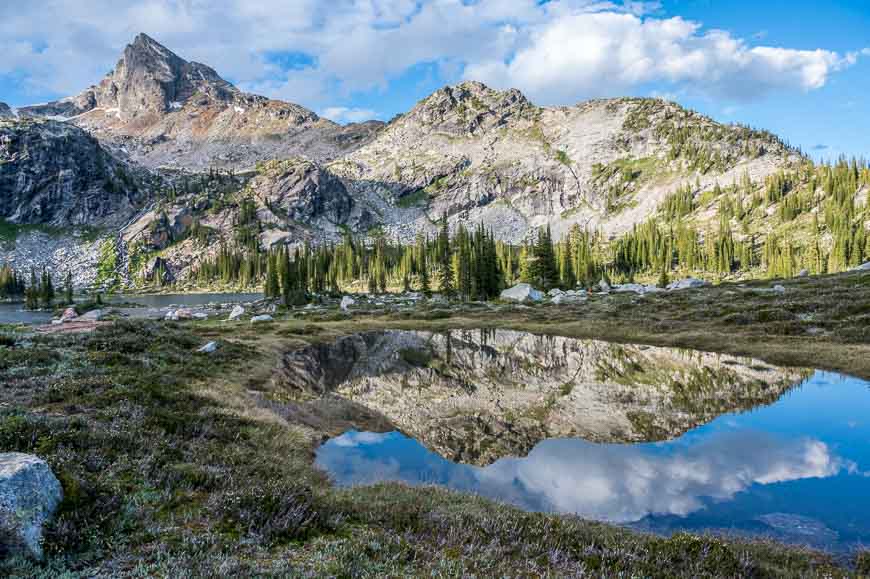
Where is Valhalla Provincial Park?
There’s a pretty good chance that you’ve never heard of Valhalla Provincial Park, unless you’re a Kootenay local with a love of the outdoors.
The park is located along the west shore of Slocan Lake in British Columbia’s Kootenay region. The nearest towns of note are Nelson and Castlegar. Still confused? It’s about a 7 hour drive southwest of Calgary.
Before you go I’d recommend purchasing a copy of the Kootenay Rockies Backroad Mapbooks. In this part of BC, where there are logging roads galore, and no cell service, it could come in very handy. It covers a huge area that will give you loads of ideas for future trips.
Location map of the Gwillim Lakes hike
Gwillim Lakes hike
The hike to Drinnon Lake, Drinnon Pass and Gwillim Lakes can be done as a day hike or a backpacking trip. If you’ve got the time and equipment I highly recommend camping at Gwillim Lakes.
Not only is there an elevation gain of 894 m, but there is a loss of 250 m so you will find it to be a lumpy hike. There is the option from the Gwillim Lakes camping area to hike up to the Upper Gwillim Lakes and scramble to Lucifer Pass.
Note: There are plans in summer 2020 to move the trailhead back so that the rough road is blocked off so the last 2.4 km of the road will need to be hiked.
This would add 4.8 km round-trip to the hike and increase hiking time into the park. We didn’t feel comfortable driving all the way when we got there and did most of the 2.4 km. It wasn’t hard, just not that interesting on the road.
The hike from the trailhead to Drinnon Lake
Leave the trailhead (elevation 1,615 m) and start up through the woods. Use your voice through here as the streams and waterfalls provide background noise and you’ll want to warn any bears of your presence.
When you pop out of the trees after about 40 minutes of hiking, you’ll be greeted with a massive rock face as seen in the photo below.
Head across the rocks, where a sign lets you know that you’re officially entering Valhalla Provincial Park. Look for rock climbers as you walk this section.
It’s only 2 km from the trailhead to Drinnon Lake. When you reach the end of the rock face, zigzag up through the trees, steeply at times, to reach Drinnon Lake. There are at least three tent pads, an outhouse and a bear-proof cache here.
Note that at all locations along this trail, camping is on a first come – first served basis.
Many people stay at Drinnon Lake if they’ve started hiking late in the day or they’re planning on a multi-day camping experience. Fishing is also reportedly good.
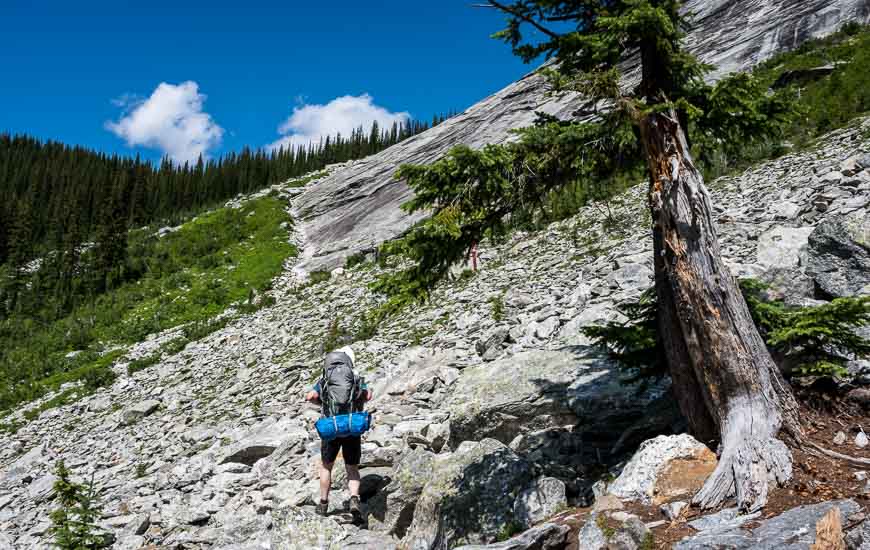
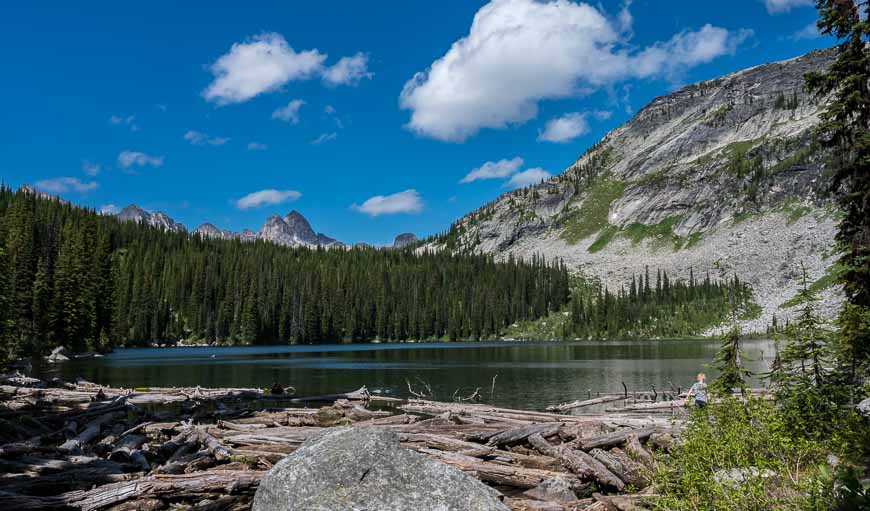
Drinnon Pass, Valhalla Provincial Park
Drinnon Pass is your next destination. It’s 1.5 km from the lake. By the time you get to Drinnon Pass you will have climbed 430 m. On this part of the hike you get a good look at the bluer than blue Drinnon Lake from above.
The best part of the hike – Gwillim Lakes
And then the really good stuff starts. The small tarns you see before you reach Gwillim Lakes give a hint of what lies ahead. To reach Gwillim Lakes it’s a 2.5 km hike from Drinnon Pass.
From the first tarns you see, drop down into a wetter area where you there’s another lake. Then the climbing starts again but at least the higher you go, the more glorious it gets. Part way up there’s a place where you can look out to the valley and watch the water cascade down a very long waterfall.
At the top of the steep hill – after another 250 m of elevation gain, the beauty of the Gwillim Lakes area hits you squarely in the face.
Numerous small tarns and crystal clear lakes sit beneath a string of mountain peaks making up part of the Selkirk Range.
You literally won’t believe the scene in front of you – glorious, breathtaking – adjectives that barely describe the beauty. Catch the golden hour on a calm night or morning and the reflections in the ponds will blow you away.
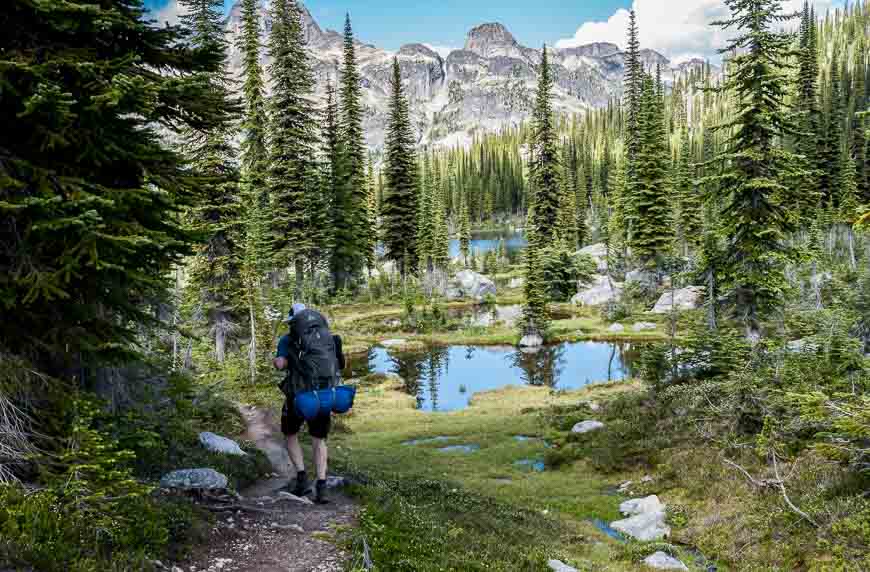
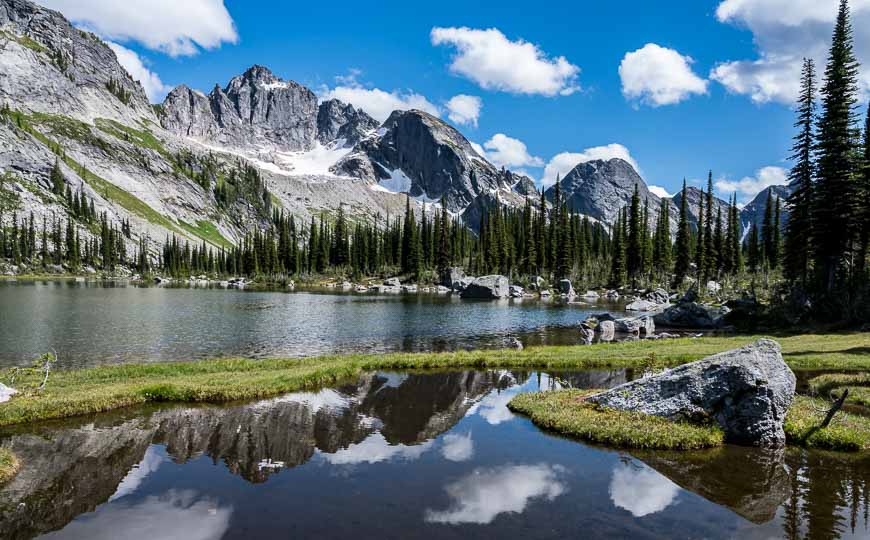
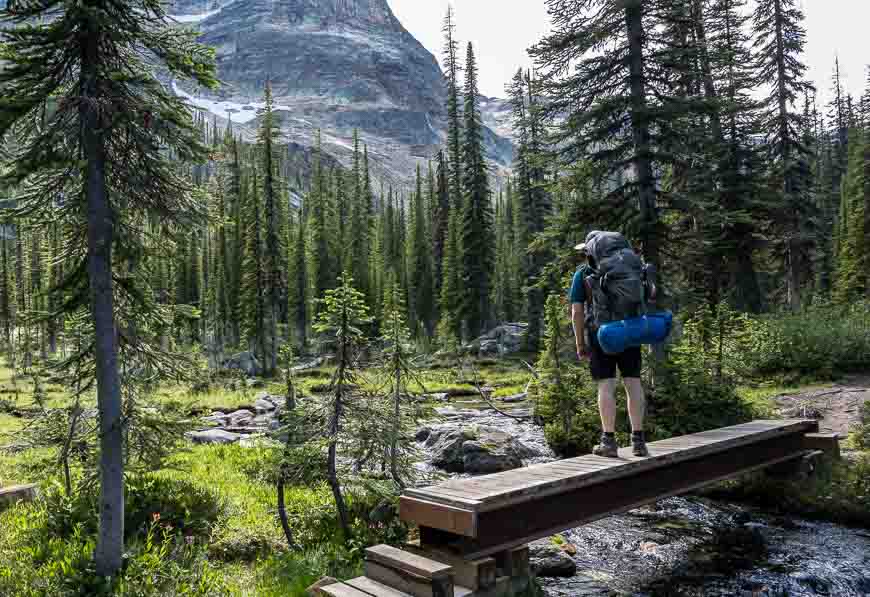
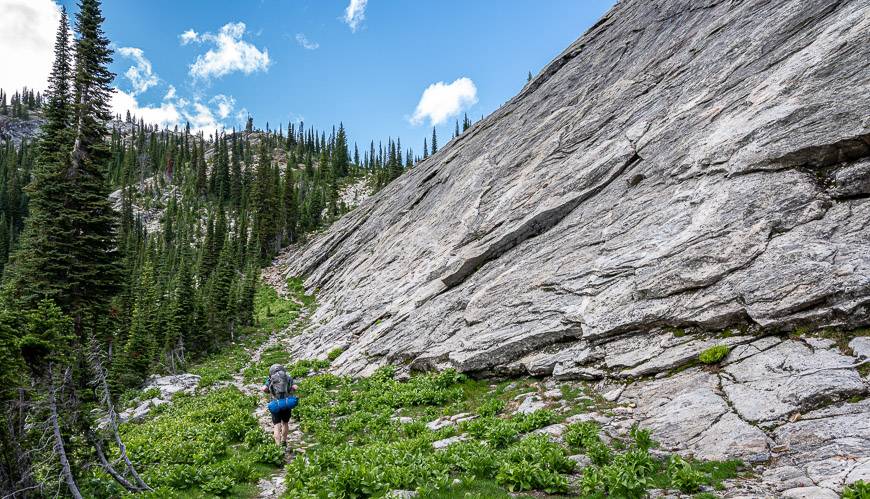
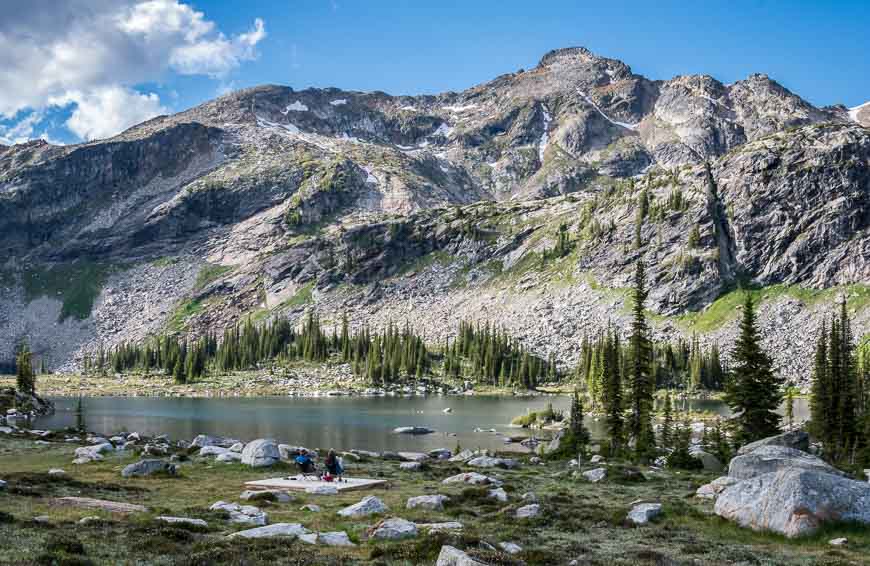
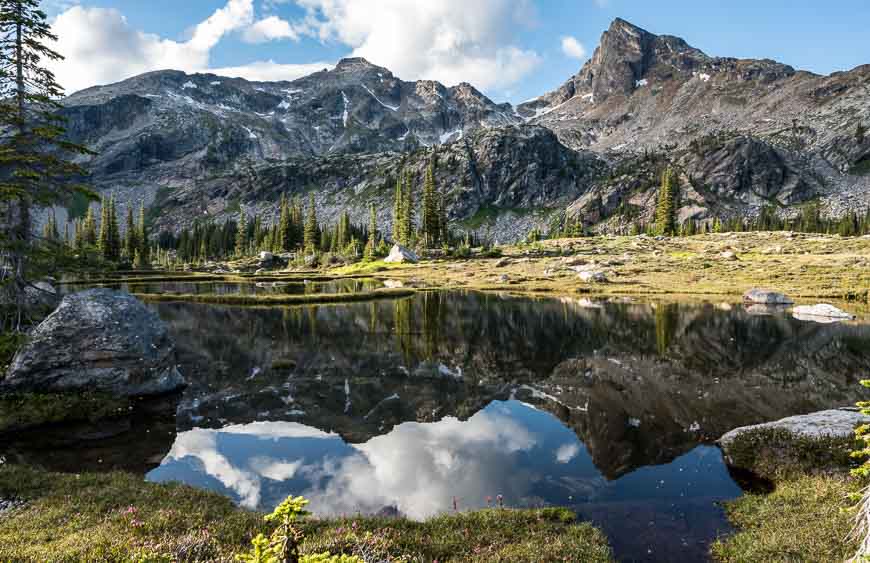
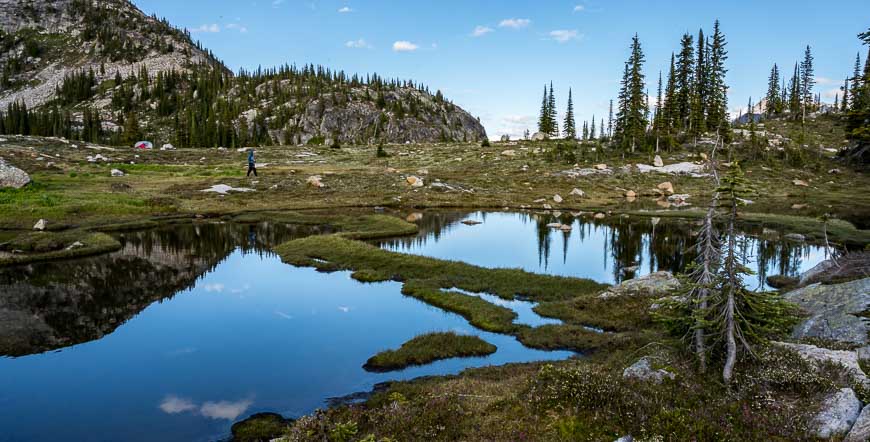
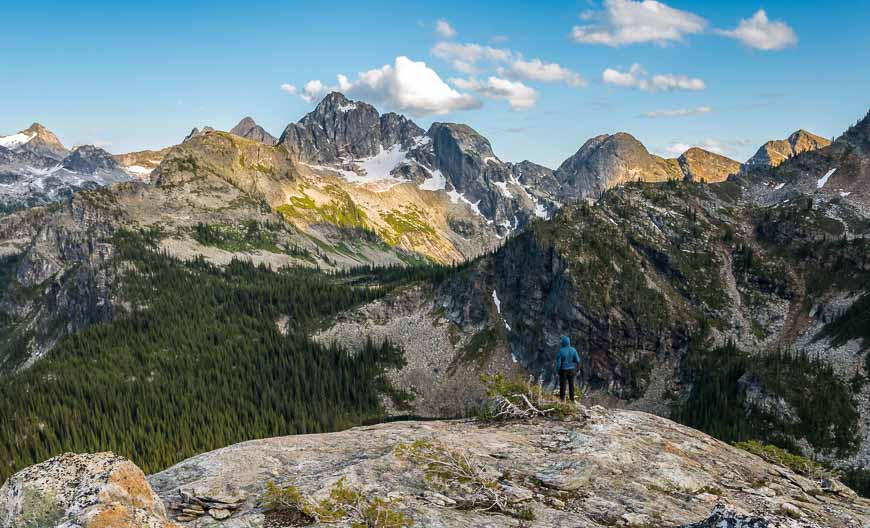
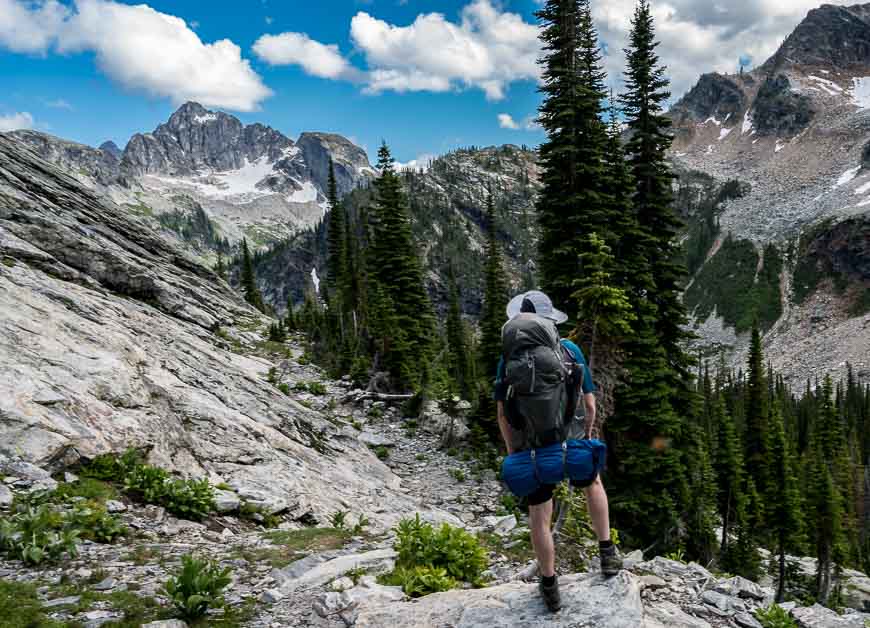
Camping in Valhalla Provincial Park
On the hike to Gwillim Lakes there are three separate camping spots Drinnon Lake, Drinnon Pass, and the most beautiful one of all – Gwillim Lakes.
At Gwillim Lakes I counted at least 13 tent pads and some of them look brand new. They are all well-spaced so you can enjoy a sense of privacy. There are two outhouses – including one with a conveyor belt for solid waste, an approach I’d never seen before. Just don’t forget to pump the pedal!
There’s also a cooking area and four large bear lockers down near one of the Gwillim Lakes. A few benches at just the right height along with some built-in platforms with wind screens make cooking easy. No fires are allowed.
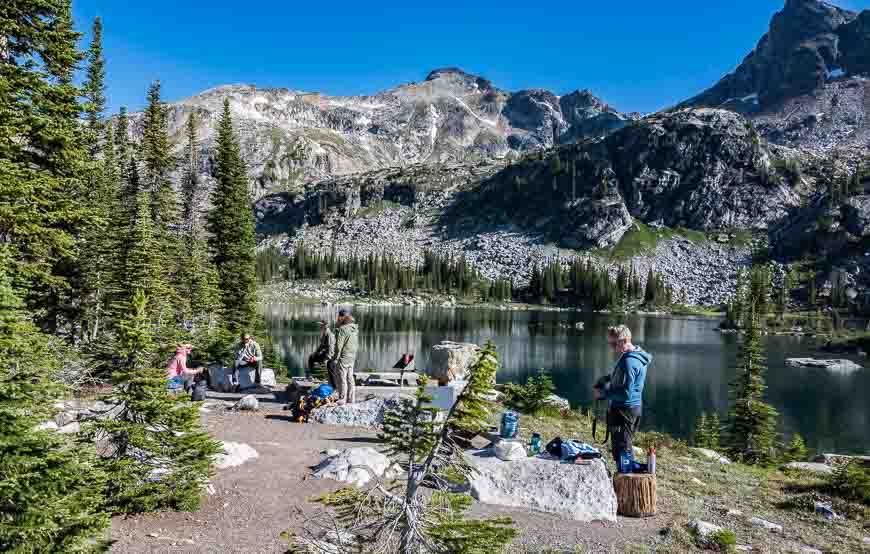
The Drinnon Pass campsite also offers at least a half dozen well-spaced campsites with some pretty lake views. You’ll also find a cooking centre at Wicca Lake, bear boxes and an outhouse.
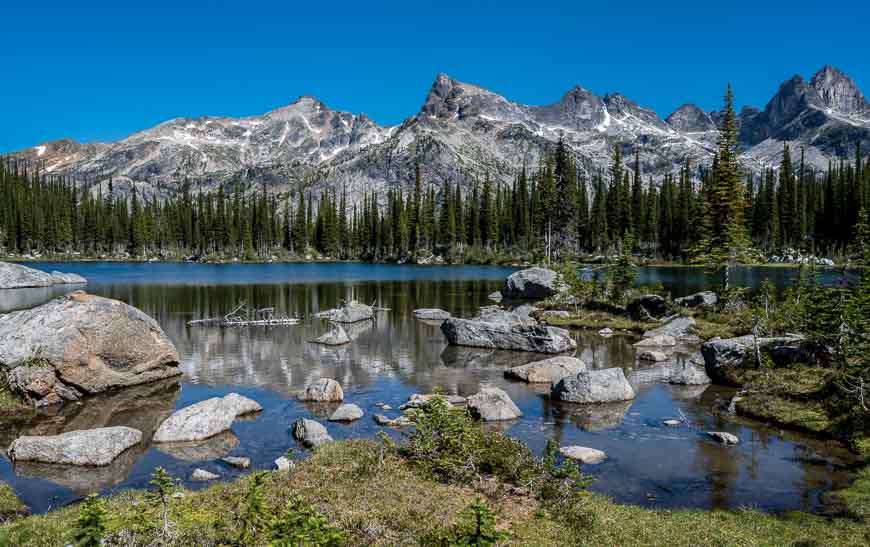
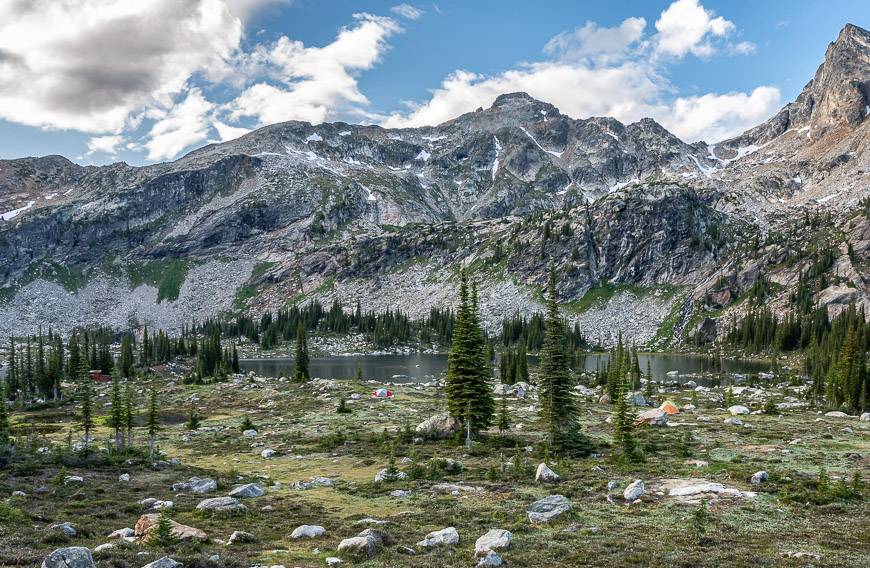
Finding the trailhead to Drinnon Pass and Gwillim Lakes
In many ways the crux of the hike is getting to the Drinnon Pass – Gwillim Lakes trailhead. I was ready to give up on account of the road in – though John was definitely not. The rough road is both a blessing and a curse.
It keeps the masses away but driving logging roads way into the backcountry is not my favourite thing to do.
There’s a lot of signage suggesting that you call in your location by radio to the logging trucks. We didn’t have a radio and we never saw a logging truck. But I would recommend that you drive defensively and pull over at a moment’s notice should you see one.
The easiest way to get to the trailhead is to start in Slocan. If you go in from Passmore you’ll spend more time on dirt roads. Take Highway 6 south to Gravel Pit Road and turn west (right if heading south) in just under a kilometre from the centre of town. Gravel Pit Road becomes Little Slocan (Forest Service Road) North.
Next look for a sign and a road branching up that says Valhalla Park, Drinnon Pass trail, roughly 21 km from Slocan. If you get to Upper Little Slocan Lake Provincial Park you’ve driven past the turnoff – but only by about 200 metres.
Follow Hoder Creek Road (signs are few and far between) up for 21 kilometres – though the last 2 kilometres as the road narrows are impassable for cars with a low clearance. We have a Subaru and decided not to take chances and parked near the bottom of the final section.
The extra few kilometres of walking up to the trailhead was worth it for my peace of mind, knowing I didn’t puncture a car or worse – a gas tank which we’ve done before. (Bring chewing gum to repair punctured gas tanks.)
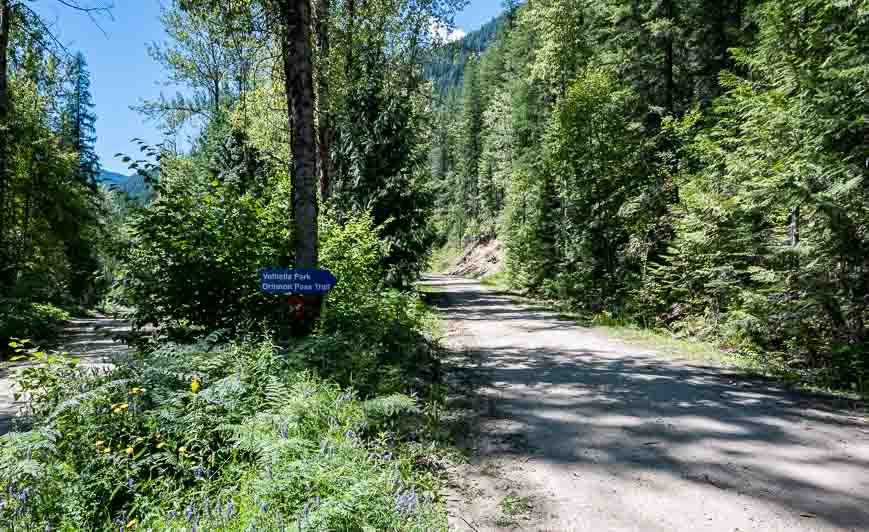
Porcupines in Valhalla Provincial Park
The last thing you want to think about while enjoying one of BC’s best hikes is the state of your car’s brakes. Plan to buy a roll of chicken wire before you head into Valhalla Provincial Park.
Wherever you park, be it at the trailhead or at some point along the final 2 – 3 kilometre section of road, wrap your car in chicken wire like they did in the car pictured below.
This will prevent the pesky porcupine from gnawing away on your car’s brake lines and causing untold misery getting back to civilization.
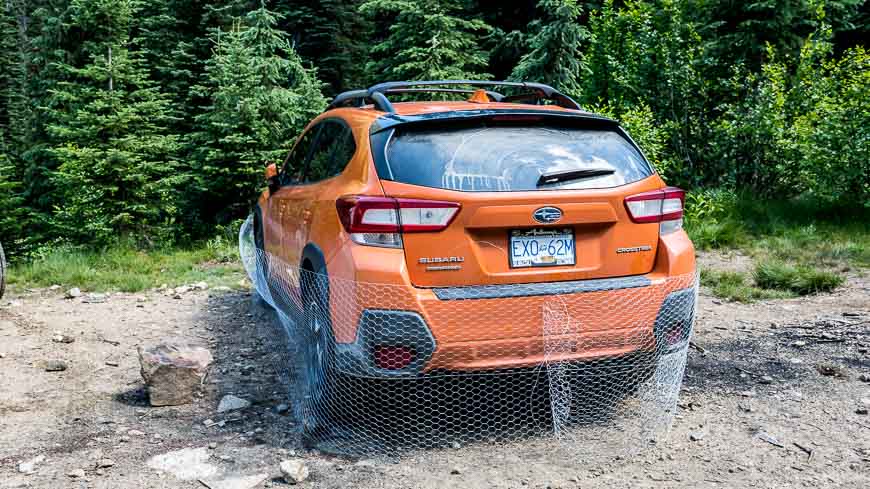
Camping at Gwillim Lakes
Camping is FREE!! It’s also first come – first served. Fortunately there are loads of campsites including an overflow area up at Gwillim Lakes. While the trail is well-used there are lots of day-hikers, so don’t despair if you see lots of cars.
The three campsites all have cooking areas away well from the camping area along with bear lockers. (You won’t have to hang your food here.)
Campsites come with wooden tent platforms and are very well spaces so you have a sense of privacy.
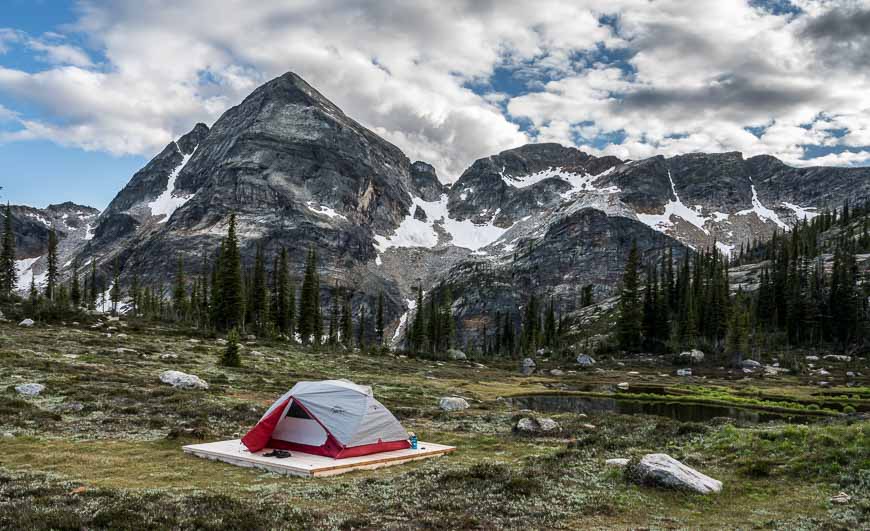
Other useful items to take on the Gwillim Lakes hike
If you’re like me and a tad clumsy and good at tearing things, take some Gear Aid with you. It’s like duct tape but better and will patch everything from tents to down jackets to your sleeping pad.
Want something soft to sit on that will also keep your butt warm and weighs next to nothing? I love my inflatable seat cushion. On the comfort theme, you might find a camp pillow gives you a better night’s rest.
Mosquitoes can be bad so don’t forget the bug spray or lotion.
Treat all your water. Consider a water purifier and water purification tablets. I also recommend the 1L Katadyn BeFree Microfilter so you can drink water without waiting on the fly.
I also recommend a map. Check out Backroad Mapbooks topo maps and look for Valhalla Provincial Park.
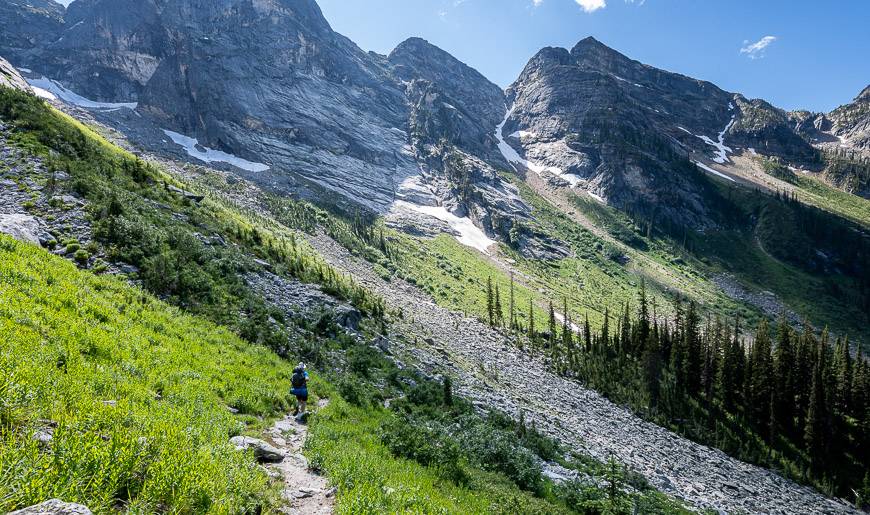
Further reading on hiking in British Columbia
- 8 Easy Invermere Area Hikes
- Old Glory Mountain Hike near Rossland, BC
- The Hermit Trail Hike in Glacier National Park BC
- A Multi-Day Hike on the Rockwall Trail in Kootenay National Park
- The Stunning Hike to the Kokanee Glacier Cabin
- The Juan de Fuca Trail: What You Need to Know Before You Go
Click on the photo to bookmark to your Pinterest boards.
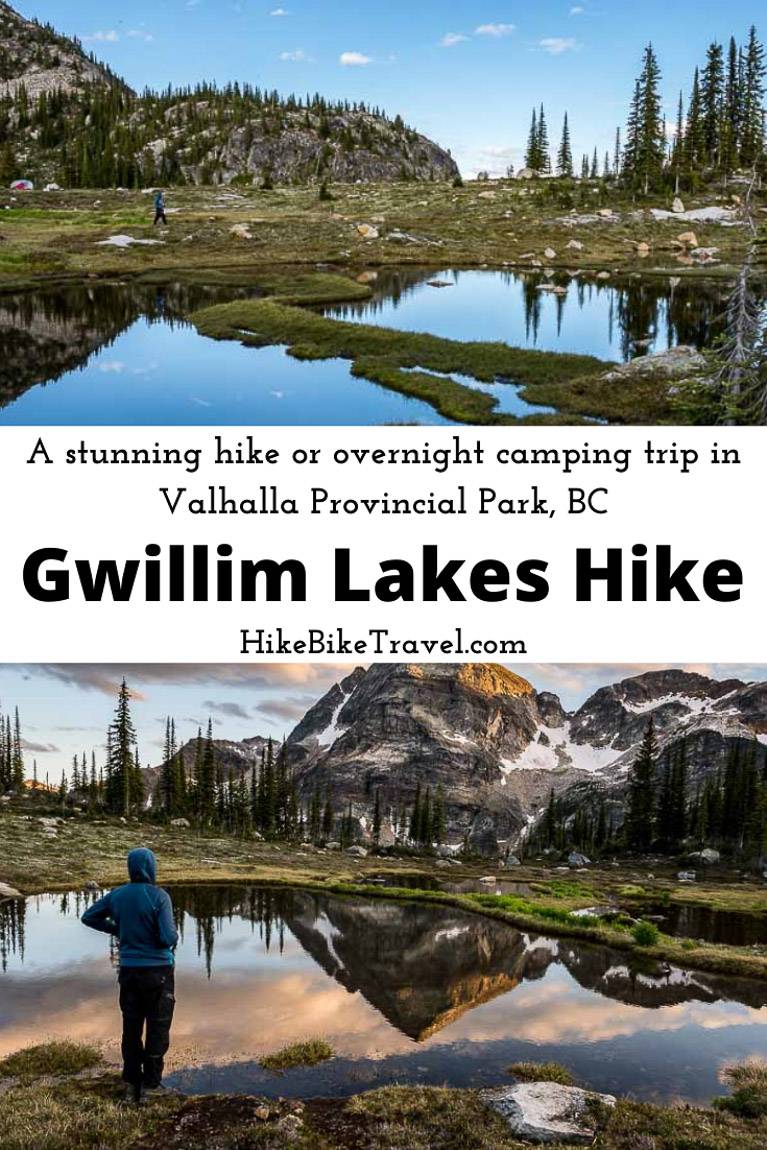
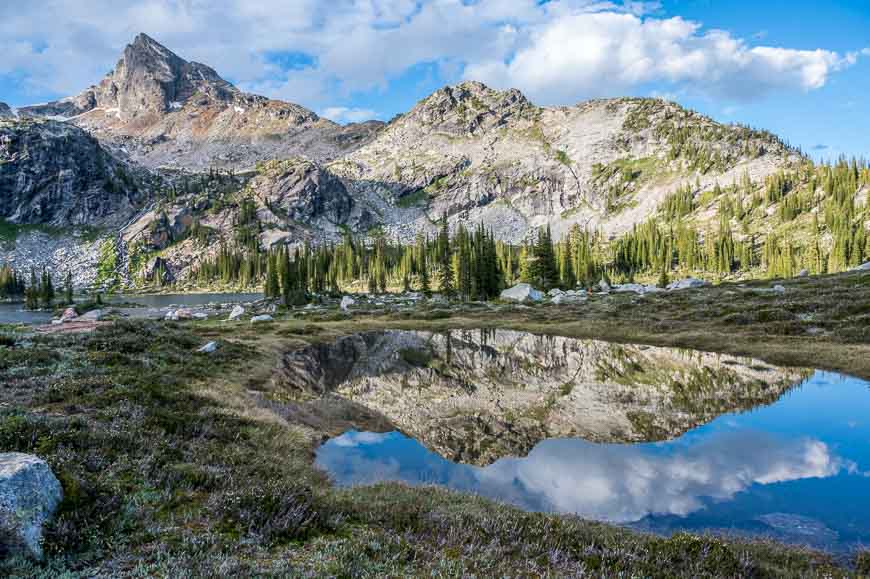
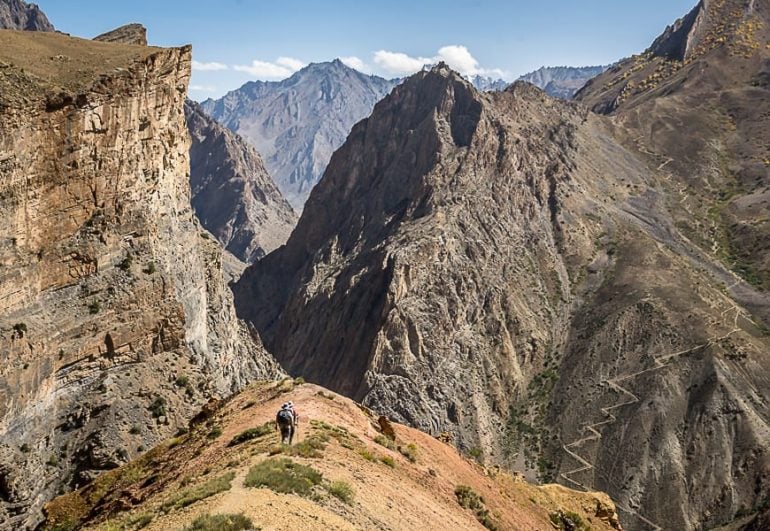
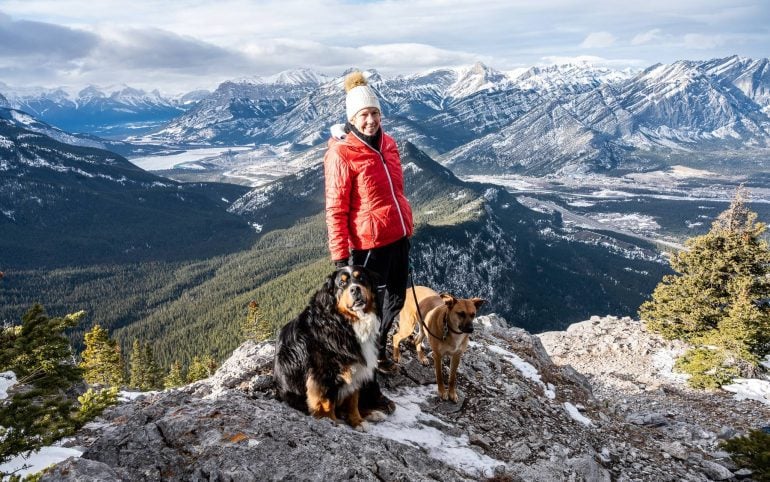
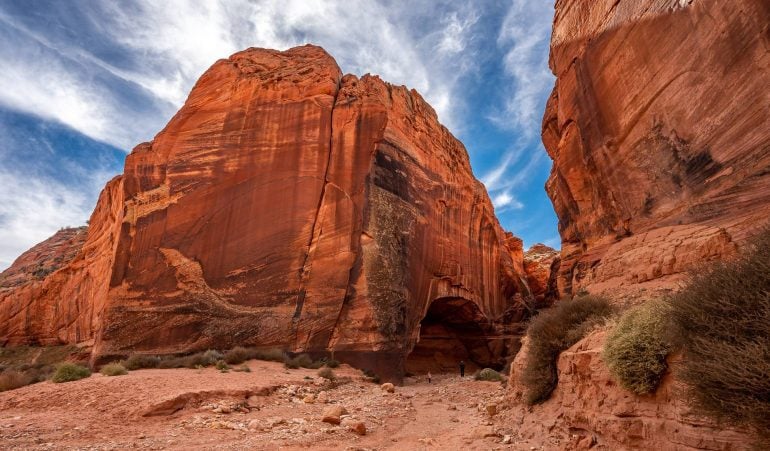
I’m thinking of travelling to this part of the Canadian Rockies solo and doing a handful of day hikes and small overnighters. I’m somewhat reluctant given it is grizzly country (am experienced in black bear backcountry in Ontario, despite never seeing one) – however reading this post, it looks like this will be well travelled in September. Any suggestions or advice?
@Anthony I think grizzlies scare a lot of people off hiking. This part of BC is spectacular in the fall (you might also want to do the Monica Meadows hike to catch the colours – on my list for September) and will likely have daily traffic especially on weekends. If you do plan to hike, I would absolutely carry bear spray that’s quick to access and no more than 2-3 years old – and make sure you know how to use it. Forget bear bells and make noise as that will scare a bear away almost all the time. If you plan to camp at Gwillim Lakes, be sure your food and toiletries are packed away in the bear boxes. There is always a risk – but it is a small one. I also have a post on bear safety – https://hikebiketravel.com/bear-safety-tips-what-you-need-to-know/. I’d also recommend bringing chicken wire to wrap your car so porcupines don’t eat the brake lines. I hope that helps.
Thanks as always
Any sense if this hike would be doable in the beginning of July?
@Amanda I have to think that most years it would be but I’d still expect to see snow in shaded areas.
We just did the hike, and the snow pack this year (2022) was still high. About 4 feet or so at Drinnon lake. (We didn’t go further). I think most years the snow would be gone by now, but we had snow for most of the trail right from the trailhead!
Thank you for the fantastic review/guide. We hope to come back another year with less snow!
@Mike Hiking in 2022 is a tad frustrating with so much snow late in the season. At least you got a taste of the area but I do hope you are able to visit again. I also have heard great things about Monica Meadows, especially in larch season.
Hi – thanks for all the useful info! I have one major question though – if I go in late August, how likely is it that I will get a site a Gw. Lakes area? I would hate to hike and then have to turn around! Or am I overthinking this??
Also, isn’t there chicken wire at the parking lot? BC parks often supplies this.
Thanks for writing a really useful blog…
C.
Hi Christof – You’re overthinking it. I would be very, very surprised if all the tent pads were taken. At the Gwillm Lakes trailhead when we were there, chicken wire was not supplied – whereas it was when we hiked into Kokanee Glacier Cabin. It’s worth the $20 investment to take your own.
Thanks! This sets me at ease… I will definitely bring a roll of wire. I can’t even imagine the alternative of getting a tow truck up there.
@Christof – And can you imagine the cost?
Well that certainly does look absolutely stunning! I’d heard of Gwillim Lakes but hadn’t actually seen how beautiful they were – this hike is on our backpacking list now!
@Andy I heard about the hike via a local who said it was the one absolute must do – and it delivered. Hope you get there – just don’t forget the chicken wire to wrap your car.
Is the Gwillim Lakes hike doable as a day trip from Nelson? Google maps is showing 7hr45min drive from Nelson to the trailhead, but this seems like a lot given the drive from Nelson to Slocan is only 1 hour.
Thanks in advance, great article!
Hi Josh – Slow to respond as I was on a kayaking trip. From Slocan it’s no more than an hour’s drive and not even that so definitely doable as a day trip from Nelson – though count on walking the first 2.4 km up the road as I don’t know if they’ve moved the trailhead.
Just a note that some of the posted elevations seem a bit off! The Gwillim Lakes campground is higher than Drinnon Pass, so it is more of a climb to get up there. You can look at the elevation profile on West Kootenay Hiking to get a better sense of the changes: https://westkootenayhiking.ca/gwillim-lakes/
Great write-up! Valhalla is a very special place.
Thanks for this. We’ve done a lot of paddling on the lake and hiked in to some of the other lakes from that side. It seems that this is a seriously underrated park. We’ll have to get in there for some more hiking now.
Could those lakes possibly be any more stunning? It sounds like the hike isn’t necessarily for the average person but the rewards are many. The photo of your campsite looks like a brochure for tenting! Who wouldn’t want to camp in a spot like that?
Great tips from talking loudly in the areas with falls or rivers, to the fencing to keep the porcupines from having a meal of the mechanical component of your car. Who knew?